11 Jul2023
By Erica Techo
This article was originally published by the University of Georgia’s College of Education.
A new study from the University of Georgia aims to improve how we evaluate children’s creativity through human ratings and through artificial intelligence.
A team from the Mary Frances Early College of Education is developing an AI system that can more accurately rate open-ended responses on creativity assessments for elementary-aged students. This project was funded by the U.S. Department of Education.
06 Jul2023
By Tunara Moore
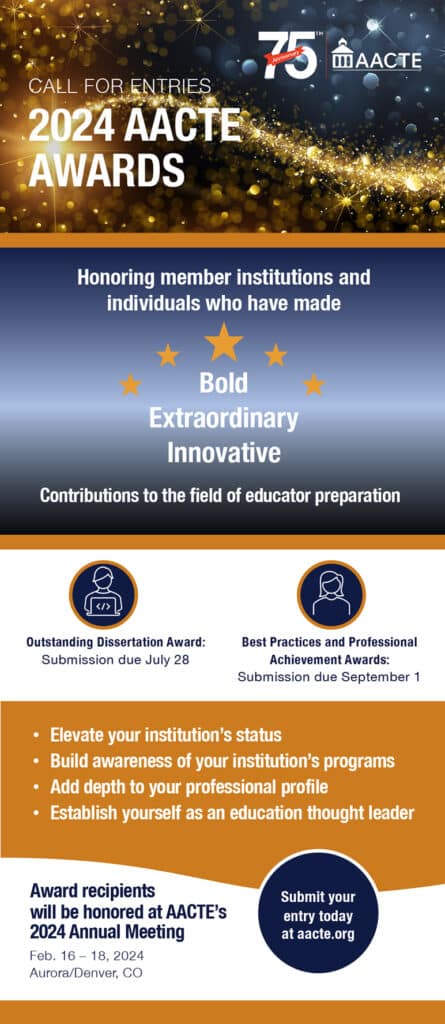 A reminder that the prestigious James D. Anderson Outstanding Dissertation Award nomination period is quickly approaching. As the leading voice on educator preparation, AACTE is dedicated to recognizing excellence in our member institutions and the individuals who have made remarkable contributions to the field.
A reminder that the prestigious James D. Anderson Outstanding Dissertation Award nomination period is quickly approaching. As the leading voice on educator preparation, AACTE is dedicated to recognizing excellence in our member institutions and the individuals who have made remarkable contributions to the field.
Learn more about the Dissertation Award, and submit your nomination by July 28. All other award nominations are due by September 1. This is your chance to shine a spotlight on the remarkable programs, practices, writing, research, and achievements that shape the future of educator preparation.
06 Jul2023
By Novea McIntosh
This blog article is part of the Global Education Faculty PLC Professional Development Series, sponsored by the Longview Foundation. The writing series aims to elevate the perspectives of international scholars — including teacher educators, graduate students, and alike — to offer insights into how Educator Preparation Programs (EPPs) can integrate intercultural understanding within their programs. AACTE members interested in participating in the series should contact AACTE’s Brooke Evans.
Note: the AACTE Call for Awards is open for the 2024 Best Practice Award in Support of Global and International Perspectives, which recognizes exemplary practice in the intercultural, global, cross-cultural, and international arenas. The 2024 Best Practice Award in Support of Multicultural Education and Diversity is also open and recognizes the infusion of diversity throughout all components of a school, college, or department of education (SCDE) as critical to quality educator preparation and professional development. If you wish to apply for one of these awards, please visit aacte.org. Applications must be received by September 1, 2023.
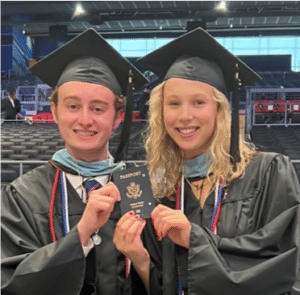 While we celebrated with 2023 graduates from colleges across the United States, some students graduated this spring with more than a diploma. These students have passports in their hands to a global experience teaching abroad, as Fulbright recipients. A recent article published in the Chronicle of Higher Education (2023), highlighted “Fulbright U.S. Scholar and Fulbright U.S. Student Programs sponsored by the State Department’s Bureau of Educational and Cultural Affairs to support academic exchanges between the United States and over 150 countries around the world.”
While we celebrated with 2023 graduates from colleges across the United States, some students graduated this spring with more than a diploma. These students have passports in their hands to a global experience teaching abroad, as Fulbright recipients. A recent article published in the Chronicle of Higher Education (2023), highlighted “Fulbright U.S. Scholar and Fulbright U.S. Student Programs sponsored by the State Department’s Bureau of Educational and Cultural Affairs to support academic exchanges between the United States and over 150 countries around the world.”
06 Jul2023
By AACTE
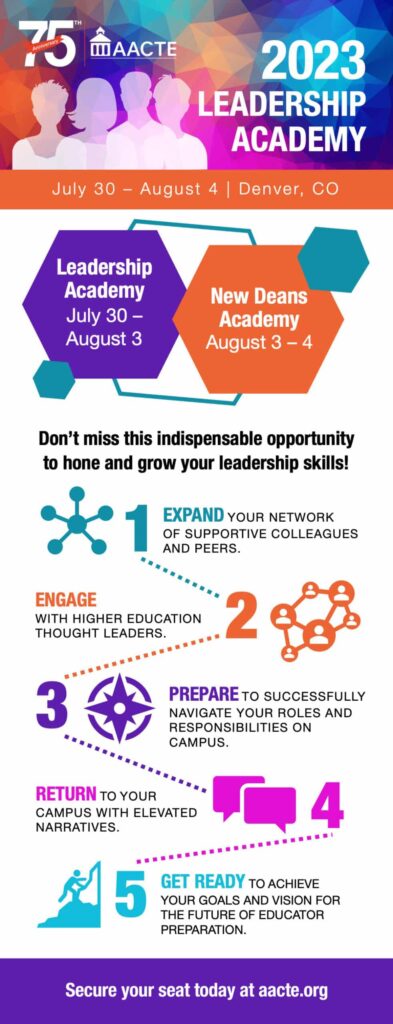 With all the summer activities and vacation breaks, AACTE understands that you may not have gotten around to registering for the 2023 Leadership Academy, so we have extended the registration deadline to Friday, July 14.
With all the summer activities and vacation breaks, AACTE understands that you may not have gotten around to registering for the 2023 Leadership Academy, so we have extended the registration deadline to Friday, July 14.
The Leadership Academy is an exclusive opportunity for deans, chairs, and heads of education preparation programs to connect with each other. Join your peers and be part of strategic conversations to elevate the work you are doing at your institution.
05 Jul2023
By AACTE
The Supreme Court’s recent decision to deny student loan debt relief to as many as 40 million low- and middle-income Americans will have many adverse personal, economic, and social consequences. One of those consequences will be to exacerbate the nation’s shortage of PK-12 educators. By making it less affordable to become or remain a teacher, principal, or other education professional, this decision will impede our ability to build the diverse, highly qualified educator workforce that our nation’s children need and deserve.
Student loan debt plays a significant role in shaping the education workforce. Concern about compensation—including being able to repay student loans—is the most commonly cited factor dissuading young people from choosing teaching as a career. AACTE (American Association of Colleges for Teacher Education) has documented that, because teachers earn less than other college-educated workers, even comparatively modest levels of student loan debt are difficult to afford. This problem is particularly acute for students of color, and so these students are far less likely to choose education as a career compared with better compensated fields such as business or healthcare. Moreover, current educators who were counting on debt relief will now be forced to leave education for better paying jobs and those who had hoped to advance in their careers by pursuing graduate education will be unable to do so.
03 Jul2023
By Kristien Zenkov
The Teacher Educators’ Journal (TTEJ) is published by the Virginia Association of Colleges and Teacher Educators (VACTE), a state unit of the Association of Teacher Educators (ATE) and the American Association of Colleges for Teacher Education (AACTE). The journal aims to stimulate discussion and reflection about issues related to teacher education; authors need not be based and research need not be conducted in Virginia for manuscripts to be considered for publication. Manuscripts submitted for consideration may be research/empirical reports and analyses, position papers, book reviews, or conceptual essays.
29 Jun2023
By AACTE
Since its founding in 1948, AACTE (American Association of Colleges for Teacher Education) has been committed to advancing the field of educator preparation and ensuring that those preparing to be teachers, principals, and other professional educators represent the diversity of the children they educate. Today’s Supreme Court of the United States decision in Students for Fair Admissions, Inc. v. President and Fellows of Harvard University is contrary to our collective efforts to build an educator workforce that is diverse and representative.
Diversity in the college student population is important to recruiting a cadre of teachers, principals, and other education professionals who reflect the diversity of the K-12 student population. Today, 79% of public school teachers identify as white while the majority of public school students are students of color.
27 Jun2023
By AACTE

Are you registered for the 2023 Leadership Academy?
You still have time to reserve your seat alongside other higher education thought leaders to expand your network of supportive colleagues and peers and develop strategies together.
Hear more about this exciting opportunity from AACTE Board Chair Monika Williams Shealey, new dean of the College of Education and Human Development at Temple University and a proud Leadership Academy Alumna.
27 Jun2023
By Kaitlyn Brennan
This weekly Washington Update is intended to keep members informed on Capitol Hill activities impacting the educator preparation community. The views expressed in this post do not necessarily reflect the views of AACTE.
It was another busy week in Washington as Members of Congress and their staff hustled to move some items across their respective finish lines before the two-week 4th of July recess. House Republicans failed to overturn President Biden’s veto of a bill repealing his proposal of $20,000 in student debt relief. Senate appropriators, for their part, approved funding totals for a dozen fiscal 2024 spending bills along party lines on Thursday, while acknowledging the need for reaching an agreement on more money in the coming months. While the allocations in the Senate are higher than those in the House for all non-defense bills, both the House and Senate committees cut the total for the Labor-HHS-Education bill; the House by $60.3 billion (29%) and the Senate by $12.2 billion (6%). When Congress last imposed spending caps from FY 2013 through FY 2021, education funding was cut and held below its starting point for years in a row- in fact when accounting for inflation, funding levels are still below the starting point.
27 Jun2023
Submit your Proposal by July 18
By AACTE

Do you want to feature your work at AACTE’s 2024 Annual Meeting at the Gaylord Rockies in Denver, CO, being held February 16 – 18? This year’s theme is Ascending New Heights: Propelling the Profession into the Future; therefore, we are looking for proposals that share perspectives on addressing current issues and providing innovative ways to approach that which has yet to be considered in educator preparation. Before you submit, watch the Tips for Submitting a Successful Proposal Video in which Roben Daubler, veteran member of AACTE’s Committee on Meeting and Professional Development, provides advice that can help ensure your proposal is selected.
Proposals are due July 18.

27 Jun2023
Legislation Addresses the Growing Mental Health Crisis in Schools
By Peter Opitz
Rep. Katie Porter (D-CA) has introduced two bills aimed at improving the support students and teachers receive when struggling with mental illness. Teachers and students alike are experiencing a mental health crisis. In 2022, over a quarter of educators reported symptoms of depression, with job satisfaction for teachers at record lows due to job-related stress. Students and youth are similarly affected by mental illness, with reports of up to 44% of college students suffering with depression and 37% with anxiety from 2021-22. The Student Mental Health Rights Act and Teacher Health and Wellness Act would improve compliance with existing federal law and expand the toolkit for well-being in schools.
27 Jun2023
By Sue Loughlin
This article was originally published by the Tribune-Star.
As a participant in a state-funded teacher residency program, Alexis Spice — then an Indiana State University senior — spent her 2022-23 year in the kindergarten classroom of Stephanie Barnett at Terre Town Elementary in Terre Haute.
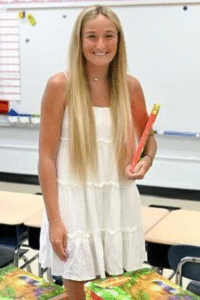 “It definitely made a huge impact on me,” said Spice, 21, who is from Vigo County and a North Vigo High School graduate.
“It definitely made a huge impact on me,” said Spice, 21, who is from Vigo County and a North Vigo High School graduate.
Barnett served as her teacher mentor, and Spice learned about setting expectations for students, developing relationships with children and families and experiencing first-hand what it means to be a teacher. She observed, taught and co-taught, the kindergarten students.
26 Jun2023
By Western Kentucky University
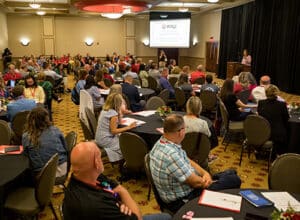 On June 22, 2023, over 120 individuals from Kentucky school districts, community colleges, universities, and government agencies gathered on WKU’s campus to discuss teacher apprentice programs and how they can be implemented to create a pipeline of educators returning to teach in their home districts.
On June 22, 2023, over 120 individuals from Kentucky school districts, community colleges, universities, and government agencies gathered on WKU’s campus to discuss teacher apprentice programs and how they can be implemented to create a pipeline of educators returning to teach in their home districts.
The Summit started with opening remarks from Kentucky Lieutenant Governor Jacqueline Coleman, WKU President Timothy C. Caboni, and CEBS Dean Corinne Murphy. Coleman discussed the importance of apprentice programs to address the teacher shortage because it allows students to “learn and earn at the same time.” Caboni emphasized the prominence of teachers to WKU, as the university started as a Normal School in 1906. Murphy highlighted how vital it is to show high school students the possibility of a career in education as a viable one and one with upward mobility.
26 Jun2023
By Nicole Dunn

Pride month is more than a celebration; it’s an opportunity to reignite the fight for equality within the LGBTQ+ community and other historically marginalized communities in allyship with all those who believe that our P-20 schools should be safe and inclusive spaces for all youth. As Pride Month comes to a close, AACTE is sharing its updated toolkit, Resources to Support LGBTQ+ Inclusion in Ed Prep and P-20 Schools, which can be found on AACTE’s Racial and Social Justice Hub.
26 Jun2023
By Kelly León
This blog article is part of the Global Education Faculty PLC Professional Development Series, sponsored by the Longview Foundation. The writing series aims to elevate the perspectives of international scholars — including teacher educators, graduate students, and alike — to offer insights into how Educator Preparation Programs (EPPs) can integrate intercultural understanding within their programs. AACTE members interested in participating in the series should contact AACTE’s Brooke Evans.
Note: the AACTE Call for Awards is open for the 2024 Best Practice Award in Support of Global and International Perspectives, which recognizes exemplary practice in the intercultural, global, cross-cultural, and international arenas. The 2024 Best Practice Award in Support of Multicultural Education and Diversity is also open and recognizes the infusion of diversity throughout all components of a school, college, or department of education (SCDE) as critical to quality educator preparation and professional development. If you wish to apply for one of these awards, please visit aacte.org. Applications must be received by September 1, 2023.
We believe preparing educators to be globally competent should be at the heart of our work as teacher educators. At San Diego State University, my colleague Gina Vattuone and I co-lead a single-subject credential cohort with the goal of preparing globally-competent teacher candidates. Each year, the cohort invites secondary teacher candidates from all subject areas to self-select into the cohort. After eight years, we have realized the importance of helping teacher candidates understand their own positionality in relation to others. We invite them to reflect on their own cultural ways of knowing and being and how these relate to the dominant, mainstream cultures of most American schools. We also want them to understand how they relate to the histories, geographies, and cultures of the young people they teach. By better understanding themselves in society, we believe teacher candidates are more able to understand their students and how to teach them.








 While we celebrated with 2023 graduates from colleges across the United States, some students graduated this spring with more than a diploma. These students have passports in their hands to a global experience teaching abroad, as Fulbright recipients. A recent article published in the Chronicle of Higher Education (2023), highlighted “Fulbright U.S. Scholar and Fulbright U.S. Student Programs sponsored by the State Department’s Bureau of Educational and Cultural Affairs to support academic exchanges between the United States and over 150 countries around the world.”
While we celebrated with 2023 graduates from colleges across the United States, some students graduated this spring with more than a diploma. These students have passports in their hands to a global experience teaching abroad, as Fulbright recipients. A recent article published in the Chronicle of Higher Education (2023), highlighted “Fulbright U.S. Scholar and Fulbright U.S. Student Programs sponsored by the State Department’s Bureau of Educational and Cultural Affairs to support academic exchanges between the United States and over 150 countries around the world.” With all the summer activities and vacation breaks, AACTE understands that you may not have gotten around to registering for the
With all the summer activities and vacation breaks, AACTE understands that you may not have gotten around to registering for the 


 “It definitely made a huge impact on me,” said Spice, 21, who is from Vigo County and a North Vigo High School graduate.
“It definitely made a huge impact on me,” said Spice, 21, who is from Vigo County and a North Vigo High School graduate. On June 22, 2023, over 120 individuals from Kentucky school districts, community colleges, universities, and government agencies gathered on WKU’s campus to discuss teacher apprentice programs and how they can be implemented to create a pipeline of educators returning to teach in their home districts.
On June 22, 2023, over 120 individuals from Kentucky school districts, community colleges, universities, and government agencies gathered on WKU’s campus to discuss teacher apprentice programs and how they can be implemented to create a pipeline of educators returning to teach in their home districts. 